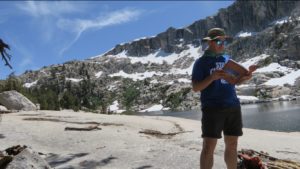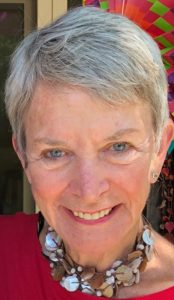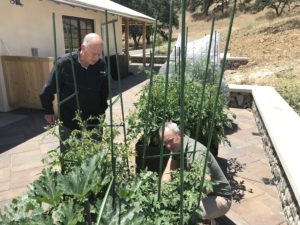From the Director…
The Oral History Center Top 10 of 2019
With Thanksgiving falling late on the calendar this year, all of the sudden things are feeling very rushed in the lead up to 2020. Despite that feeling, your friends here at the Oral History Center set aside a few moments to reflect on some of the more memorable episodes of 2019. This year we again conducted about 500 hours of interviews and did a whole lot more too, such as produced two seasons of our podcast series, The Berkeley Remix, taught scores of eager students about oral history, and traveled the nation to record our interviews. The countdown that follows, then, is just a snapshot of those times that made us laugh, let us weep, and forced us to sit back in awe of the impactful research we do and the wonderful stories we are honored to record.
- OHC historian Shanna Farrell started an oral history book club. Her first selection was Patrick Radden Keefe’s remarkable new book, Say Nothing: A True Story of Murder and Memory in Northern Ireland (if you want to know more, check out the not-so-oral history transcript of our conversation).
- The work of the Center was featured wide and far through a variety of media, providing an ever-larger opportunity for folks to engage with the work that we do. OHC oral histories were featured on podcasts such as East Bay Yesterday, California Report Magazine, and The Dropout (about Theranos founder Elizabeth Holmes); and news of our work was featured in California Magazine and regularly on Berkeley News and even a few times on the homepage of the Berkeley website, thanks to the efforts of our newest employee, Communications Manager Jill Schlessinger.
- A 2019 highlight for OHC historian Roger Eardley-Pryor was his interview with H. Anthony “Tony” Ruckel, former President of the Sierra Club. Ruckel helped pioneer the then-nascent field of environmental law. Roger recalled, “During his interview, Tony explained how, in 1969, as a ‘green’ 29-year-old lawyer, he brought the precedent-setting Parker v. United States case under the Wilderness Act of 1964 to protect land near Vail, Colorado that eventually became Eagle’s Nest Wilderness. To prepare for his interview, I read Tony’s book on environmental law, Voices for the Earth (2014), while backpacking through the Emigrant Wilderness in the high Sierra Nevada, just north of Yosemite National Park. What better place to read about Tony’s efforts to preserve wilderness than a designated wilderness area!”

- On occasion, we have the opportunity to host a special event celebrating the completion of an oral history. In August, we fệted Anne Halsted, the community advocate who has spent tireless decades serving many nonprofit organizations and government agencies striving to improve communities in the Bay Area. After the formal presentation, those attending were treated to spontaneous memories and tributes; perhaps the one that got the most applause was when someone proclaimed that Halsted should have been our first female President! This event also marked the official kick-off of our new oral history project on Women in Politics — check back in 2020 for more news on this.

- East Bay Yesterday host Liam O’Donoghue was the keynote speaker at the 2019 Summer Institute and provided the group assembled with a complex view into the history of our region that clearly demonstrated the power of oral history to bring the past alive.
- Shanna Farrell reflected on 2019 and concluded a highlight for her was traveling to New York to interview the celebrated abstract sculptor Mel Edwards. Farrell wrote, “His work is so powerful and he’s so intelligent that meeting him in person was a really gratifying experience. Participating in the Getty Trust oral history project, even in a small way, has been one of the best oral history projects on which I’ve worked.”

- HBO released to wide-acclaim its popular miniseries Chernobyl, based on the collection of oral histories Voices of Chernobyl. The author of this book, Svetlana Alexievich, won 2015 Nobel Prize in Literature in part for this work. (This book will be the first OHC book club selection of 2020 — why not read along with us?)
- When asked about 2019, OHC historian Paul Burnett was momentarily stumped, but then replied, “In an annual roundup, it’s a bit unusual to write about something that began in the fall of 2017, but my work with UC Berkeley engineering scientist George Leitmann qualifies. At twenty-three hours, his oral history is a very deep dive into one person’s life story. More than that, George and I spent many hours poring over photo albums, looking at artifacts, and planning the final look of the interview volume. His oral history is extraordinary, not only because it showcases an extraordinary person, which he is; but also because of the extraordinary history he witnessed.”
- Producing our own podcasts were definitely a highlight. We released two seasons this year — 6 full-length episodes! The first was called Let There Be Light: 150 Years of UC Berkeley. This featured three episodes edited and narrated by three OHC historians (Paul Burnett, Amanda Tewes, and Shanna Farrell); the podcasts provided three snapshots of Cal’s history at 150 years. The second season was Hidden Heroes, which drew upon the interviews of the East Bay Regional Park District Oral History Project. Produced by Shanna Farrell and Francesca Fenzi, these three episodes built upon the stories told in the interviews, illustrating, we think, the transformative power of oral history and the important role of parklands in our lives.
- And, drumroll, the Number One on this list comes from yours truly. We’ve made no secret of the fact that in 2019 we partnered with local public radio station KQED and the California State Archives to conduct Governor Jerry Brown’s oral history. The interview is done and we’re currently editing the transcript for release in January (finger’s crossed!). I joined KQED’s Scott Shafer and our own OHC historian Todd Holmes in asking the questions, and, as you’ll see when it is released, there were highlight points-a-many in the result exchanges. But one special moment I’ll recall for a good long time was when the dialog changed from historian-and-governor to gardener-and-gardener. During one lunch break in the blazing heat of summer at the governor’s ranch, Brown admitted to me that he was concerned about the progress of his tomatoes: were those blotches a disease? Why was there no fruit yet? I was happy to provide a quick consultation and when I returned a few weeks later, I was relieved to see a healthy bush ripe with cherry tomatoes!

I hope that everyone in the reach of this newsletter had the good fortune of experiencing their own top 10 moments of 2019 and wish more such positive memories and proud accomplishments for 2020. It is imperative that I recognize the OHC Top 10 could not have happened without the support of so many people: the OHC staff is second-to-none and are a pleasure to work with; our student employees continue working quietly but so professionally and productively behind the scenes; and, without question, our narrators’ gift of their time and their memories is the beating heart of our work, and always will be. Our generous partners and individual sponsors make this work possible, and we are deeply grateful for the support that they provide. We hope that you, too, will remember the Oral History Center as you make your year-end gifts — and we make it easy for you to do so here. We’ve got some great things planned for 2020, so please continue on this journey will us in the months and years to come.
Martin Meeker
Charles B. Faulhaber Director
Oral History Center